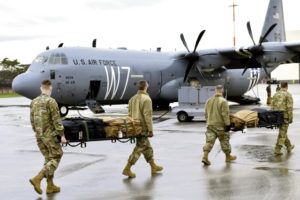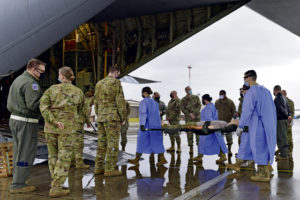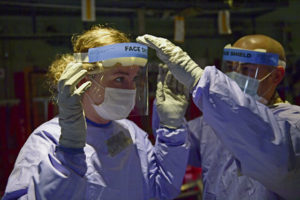
The 86th Aeromedical Evacuation Squadron held a COVID-19 patient movement training using the Negatively Pressurized Conex-Lite at Ramstein Air Base, Dec. 14-18, 2020.
The week-long training ended with a proof of concept flight on a C-130J Super Hercules aircraft, solidifying the entire process of U.S. Air Forces in Europe and Air Forces Africa COVID-19 patient transfer capabilities for the 86th Airlift Wing.
“It was the first time an NPC-L has taken off, at least in U.S. European Command, having a training mission on it, all the assets, and coordinating the integration from the ground piece to the in-flight piece,” said Capt. JD Pilger, 86th AES training flight commander. “Previously everything was done on the ground, so this is a big deal. The capstone for the week was getting this thing airborne and proving this concept and capability for EUCOM.”
Operations such as these are historically placed within the Air Mobility Command, specifically at Joint Base Charleston, South Carolina. The initial force training was only conducted there for the entire Air Force, which would then piece together teams to send on deployments to provide this capability operationally.
In July, however, AMC started a flagship initiative to send certified trainers to Ramstein Air Base to certify 86th Medical Group and 86th AES personnel to be the initial cadre on the NPC. This established an organic capability located overseas, therefore widening the pool of certified personnel to the force, said Maj. Josh Williams, 86th AES operations flight commander.

From the 721st Aerial Port Squadron loading the NPC-L onto the aircraft to the 86th MDG and 86th AES infectious disease team ensuring proper personal protective equipment was worn during each scenario, multiple units were called upon to contribute to the training.
“The training was for developing another force package for the 86th AW, to enable us to move COVID-positive patients utilizing the NPC-L,” Pilger said. “The force package entails members from the 86th MDG, the 86th AES and additional folks over at Landstuhl Regional Medical Center, such as our Critical Care Air Transport Team.”
The NPC-L is a smaller version of the Negatively Pressurized Conex, an isolated containment chamber intended to transport individuals with infectious diseases like COVID-19. While the NPC is used on C-17 Globemaster III aircraft, the NPC-L was developed for use on a C-130J.
“Pursuant to a U.S. Trans-portation Command joint urgent operational need request, (the NPC) was fielded, and the follow-on to that was the NPC-L,” Williams said. “That is what we’ve now developed our teams and force packages within the 86th AW to support. (The NPC) is actually loadable on a C-130 and can transport patients in EUCOM, as well as U.S. Africa Command.”

Up to nine ambulatory patients, four litter patients, two CCATT critical care patients, or variations thereof, can be transported in the NPC-L.
During the training, Airmen were presented with various patient transfer scenarios and worked together to execute the mission both on-ground and in-flight.
“It was a true team sport throughout the whole thing,” said Capt. Zachary Gooch, 86th AES operations support flight commander. “We could not have done it without the support from Air Terminal Operations Center, maintenance or the medical group.”
Having this organic capability enables Ramstein to provide COVID-19 patient movement overseas without the need for assets deployed from AMC.
“I think we proved that this can be done without having a deployed asset that rolls in and sets up shop,” Gooch said. “We did it, basically, from grassroots.”







